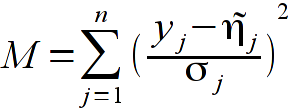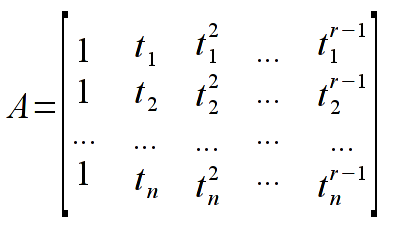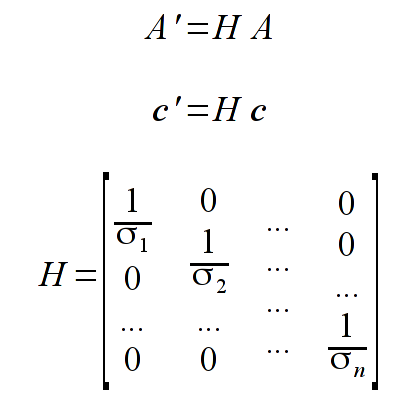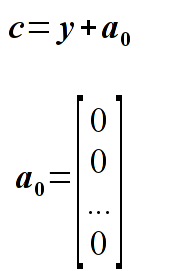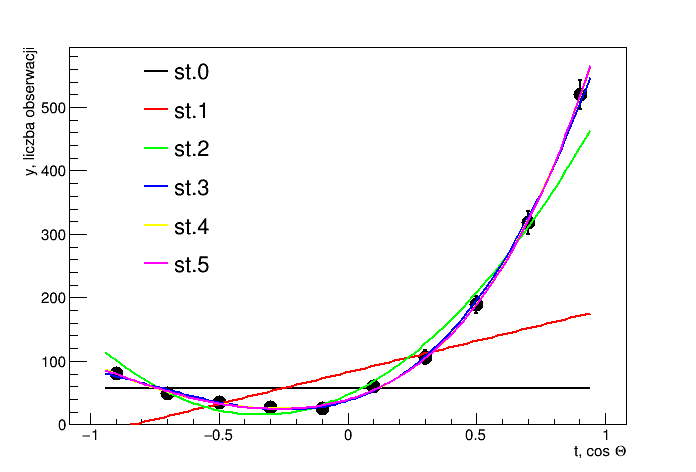KADD 2022 Laboratorium 11 ENFrom Łukasz GraczykowskiZadanieLeast-squares method (5 pkt.) Using the least-squares method, fit to the data polynomials of varying degrees
Comment: we search from a minimum of M function (equivalent of chi-squared statistics), values Example function definition: // Function returns M // parameters: // st - degree of the polynomial // n - number of measurements // tj - array of cosine of scattering angles // yj - measurement results // sigmaj - measurement errors // wsp - array in which we need to save estimated coefficients ( To implement the formulas please use the class TMatrixD. Examples: // utworzenie macierzy o wymiarach n x m TMatrixD *macierzA = new TMatrixD(n,m); // dostep do elementu o indeksach i,j macierzy macierzA, np.: (*macierzA)(i,j) = 1; // mnozenie macierzy: macierzA = macierzB macierzC TMatrixD *macierzA = new TMatrixD(*macierzB, TMatrix::kMult, *macierzC); // transponowanie macierzy TMatrixD *macierzAt = new TMatrixD(TMatrix::kTransposed,*macierzA); // odwracanie macierzy macierz->Invert();
ResultOutput: Dopasowanie wielomianem stopnia 0 M = 833.548 x0 = 57.8452 +- 2.4051 Liczba stopni swobody=9 Kwantyl=21.666 Poziom istotnosci=0.01 Stopien 0: odrzucamy Dopasowanie wielomianem stopnia 1 M = 585.449 x0 = 82.6551 +- 2.87498 x1 = 99.0998 +- 6.29159 Liczba stopni swobody=8 Kwantyl=20.0902 Poziom istotnosci=0.01 Stopien 1: odrzucamy Dopasowanie wielomianem stopnia 2 M = 36.4096 x0 = 47.267 +- 3.24753 x1 = 185.955 +- 7.30235 x2 = 273.612 +- 11.6771 Liczba stopni swobody=7 Kwantyl=18.4753 Poziom istotnosci=0.01 Stopien 2: odrzucamy Dopasowanie wielomianem stopnia 3 M = 2.84989 x0 = 37.949 +- 3.62403 x1 = 126.546 +- 12.5894 x2 = 312.018 +- 13.4278 x3 = 137.585 +- 23.7499 Liczba stopni swobody=6 Kwantyl=16.8119 Poziom istotnosci=0.01 Stopien 3: akceptujemy Dopasowanie wielomianem stopnia 4 M = 1.68602 x0 = 39.6179 +- 3.94036 x1 = 119.102 +- 14.3563 x2 = 276.49 +- 35.5643 x3 = 151.91 +- 27.2096 x4 = 52.5999 +- 48.7566 Liczba stopni swobody=5 Kwantyl=15.0863 Poziom istotnosci=0.01 Stopien 4: akceptujemy Dopasowanie wielomianem stopnia 5 M = 1.66265 x0 = 39.8786 +- 4.29351 x1 = 121.384 +- 20.7054 x2 = 273.188 +- 41.6103 x3 = 136.571 +- 103.954 x4 = 56.8995 +- 56.2858 x5 = 16.7294 +- 109.424 Liczba stopni swobody=4 Kwantyl=13.2767 Poziom istotnosci=0.01 Stopien 5: akceptujemy |
